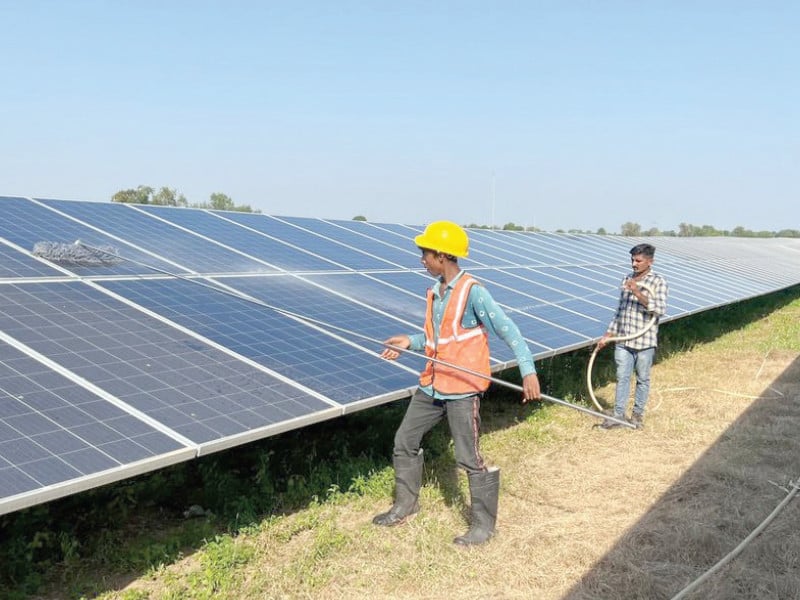Net metering, also known as solar photovoltaic (PV), is a very popular topic right now that has sparked a lot of debate and attention. The government mostly wants to change the rules about money, but people who use net metering would rather keep the rules as they are.

Without a doubt, many countries have offered appealing benefits for rooftop solar, but these have been slowly taken away as well.
There are good and bad things about solar electricity, especially rooftop solar PV. It’s a green source that doesn’t pollute, and it also brings in technology.
People are more aware of things because of rooftop solar. It has also helped the economy and created jobs. It has even helped train a new generation of technology experts, which will have long-term effects.
In the long run, grid dependence will go down, and less money will need to be spent on both production and transmission and distribution.
Distribution companies (DISCOs) and the government, which has the money, both have problems. Not to use too much technical language, but the overloading of the distribution transformers and the production of bad energy (low power factor and harmonics) are problems. People get permission for less capacity, but then they add more capacity, etc.
The biggest problem, though, is money. What’s wrong is that solar power only works during the day. In that way, it’s an extra capacity that makes the current grid capacity unnecessary.
To put it another way, more grid and power plant capacity needs to be added. Solar doesn’t get rid of DISCOs’ duty to provide energy to “prosumers,” which is a word that means “producers plus consumers.”
The extra cost of this means that DISCOs have to pay more for power, which leads to a higher average tariff or losses for DISCOs. This is seen as a cross-subsidy for people who use solar power.
People who say that the net metering subsidy goes to the wealthier part of society instead of the average or low-income group make the situation worse.
Prosumers who use net metering are usually those who have spent between Rs500,000 and Rs3–4 million. It’s clear that they are wealthy, even if they hide behind loans, which are also only given to wealthy people because of the security, guarantees, and other paperwork that is needed. So, it looks like there is a case for cutting back on this support, if not getting rid of it completely.
But there is also a moral and maybe even legal problem that can lead to lawsuits from the prosumers. The terms and conditions are written down in a kind of contract between the prosumers and DISCOs.
These kinds of terms have led people to spend their money or borrow money. Because of this, any changes to the rules might need to take this into account.
Also, lowering rewards by a large amount all of a sudden could have an effect on the market and the economy. It is said that traders have brought in 5 gigawatts (GW) of solar panels and the equipment that goes with them in just the last six months. Any drop in the solar market will cause bad things to happen. The only part of the construction business that is doing well is the solar field.
But in just a few years, solar prosumers will have to deal with the possibility or guarantee of less help from the government. Also, DISCOs would no longer have to worry about getting back the money they paid for capacity.
How and why? This is because battery storage has become popular and their prices have been going down over time. Li-Ion batteries have been around for at least 20 years, but they have only lately become more affordable, especially in our area.
The trend is likely to keep going. Because of the growing need for storage, a number of local makers (assemblers) have also sprung up.
The subscriber is using the DISCOs’ grid as a place to store things. After putting in the cheap batteries, he won’t need the DISCO power, at least during peak hours.
And the problem only happens during rush hours. The trouble with capacity isn’t caused by the fact that less electricity is being used at night. So, we need to find ways to encourage people to store batteries.
Taking all of this into account, one would like to suggest the following: 1-Those who have finished installations for five years will have to follow new rules and terms and conditions; 2-The attractive solar net metering price for users of up to 10 kilowatts should stay in place; 3-Prosumers with 11 to 15 kW may be able to get a less appealing rate; 4-Net metering should be limited to 15 kW; 5-Prosumers should only be able to send 30% of their installed or generated power to the grid through net metering; 6-Those who add four-hour battery storage should get a higher export tariff, the same as those in the 10 kW category; 7—Consumers should be able to use net metering where the distribution transformer has enough capacity, even though this could give DISCO employees too much power and lead to cheating. All rules help the people who have to follow them. What else can be done?
The author has written several books about the energy industry and used to be a member of the Energy Planning Commission.










































